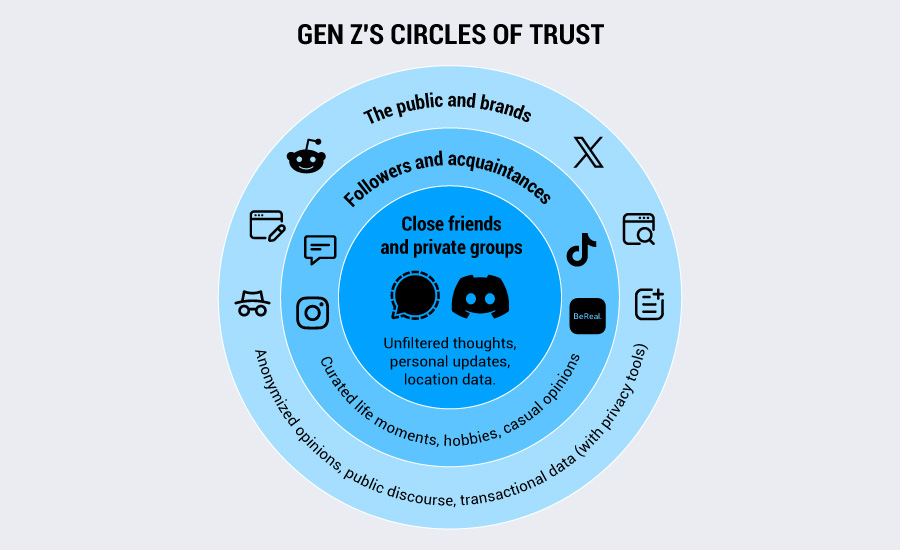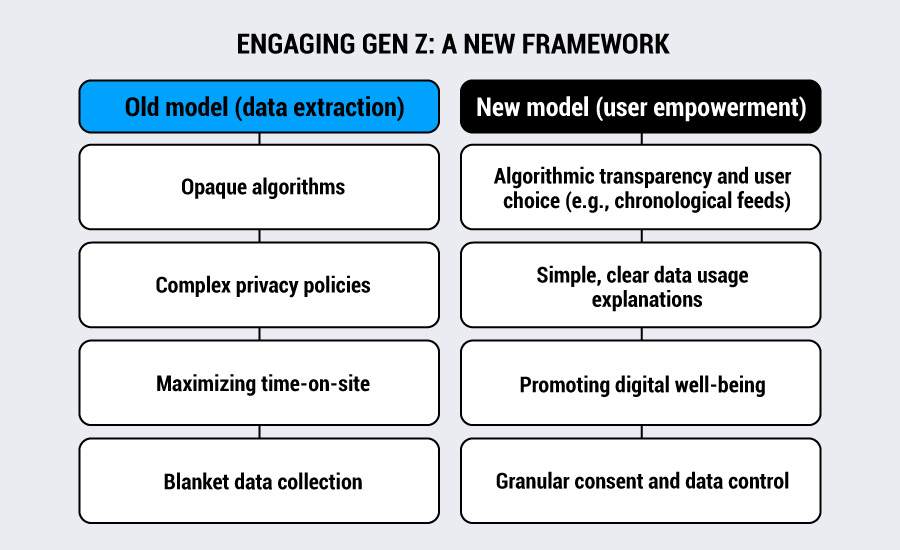Gen Z is often seen as the generation that grew up online, fluent in the language of likes, shares, and fleeting trends.
But this digital nativity comes with a nuanced understanding of the platforms they inhabit — a perspective that is driving a quiet but powerful revolution in how we think about online control.
They are not logging off en masse or rejecting technology outright. Instead, Gen Z is pioneering a new form of digital autonomy. They are meticulously curating their online experiences, setting firm boundaries, and demanding a level of transparency unconsidered by previous generations.
Gen Z, ranging in age from approximately 13 to 28, is a generation that balances the immense convenience of the digital world with an unwavering demand for control, shaping their identities in spaces governed by unseen algorithms.
Key takeaways
- Gen Z approaches digital platforms pragmatically, understanding algorithms as systems to navigate rather than magical engines.
- This generation is redefining online control by meticulously curating their experiences, setting boundaries, and demanding transparency from tech companies.
- Privacy for Gen Z is a dynamic spectrum, managed with precision across different relationships and platforms, moving beyond a simple public/private dichotomy.
- Gen Z is willing to share data when benefits are clear, but they quickly revoke access or abandon platforms that overstep boundaries.
- This generation demands ethical technology and holds companies accountable for societal impact, prioritizing transparency and user empowerment over engagement at any cost.
- Gen Z’s habits are shaping the future of the internet, driving demand for data rights and more human-centric digital design.
The illusion of choice in a curated world
For many, the internet feels like a space of infinite choice. We select what to watch, who to follow, and what to buy. However, beneath this surface appearance of agency lies a complex network of algorithms designed to guide our decisions, often in ways we don’t fully perceive or understand.
These systems analyze our behaviors to build a predictive model of our preferences. The goal is to keep us engaged by serving content that aligns with the things we care about.
While this can introduce us to new creators or products, it also constructs a personalized reality, an echo chamber that can narrow our perspectives and limit exposure to diverse viewpoints.
This algorithmic curation extends beyond entertainment. It influences the news we see, the job postings that appear in our feeds, and even the social connections we make. The convenience of a personalized internet comes at a cost: a subtle erosion of genuine choice.
We are presented with a menu of options, but the menu itself has been pre-selected for us, making true digital autonomy a complex challenge.
Gen Z’s pragmatic approach to digital life
Gen Z understands this dynamic better than any generation before them. Having grown up within these frameworks, they view the algorithms not as magical suggestion engines but as systems — created by companies with their own agendas — to be navigated, managed, and sometimes, outsmarted.
Their relationship with technology may be more pragmatic and less emotional than generations before them.
They recognize that their data is the currency that powers the “free” platforms they use daily. This isn’t a cynical resignation; it’s a clear-eyed assessment of the value exchange. This awareness fuels a proactive approach to managing their digital footprint.
Unlike the digital utopianism of early internet pioneers or the privacy anxieties of Millennials, Gen Z’s stance is one of calculated engagement. They are willing to share data when the benefit is clear and compelling, but they are equally quick to revoke access or abandon platforms that overstep their boundaries.
Forging identity beyond the algorithm
Identity formation is a topic as old as time. For Gen Z, this journey has been unfolding in both physical and digital spaces, adding to its complexity. Social media platforms can especially create pressure to conform to trending aesthetics, viral challenges, and idealized personas.
However, many within this generation are actively resisting. They are creating alternative spaces and adopting practices that prioritize authentic self-expression. This is not about crafting a single, polished online brand, but about exploring the multifaceted nature of their identities. And some are eschewing spaces like social media platforms entirely.
The rise of “finstas” (fake Instagram accounts intended only for close friends), niche Discord servers, and group chats are a direct response to the pressures of mainstream platforms. In these smaller, more controlled environments, users can share unfiltered thoughts, inside jokes, and personal struggles without the fear of broad judgment, abuse, or algorithmic manipulation.
This is where they can be themselves and make real connections, away from the curated perfection often demanded by public-facing profiles.
Redefining privacy as a spectrum
For Gen Z, privacy is not a simple on/off switch. It is a dynamic, context-dependent spectrum that they manage with sophisticated precision. They intuitively understand that different situations and relationships call for different levels of disclosure.
For example, they might share their location with a handful of close friends in a dedicated app, while simultaneously using ad blockers to hide browsing activity from companies.
They might post a candid video to a private story on Instagram, visible only to a curated list of followers, while maintaining a professional and reserved profile on LinkedIn. This granular control is a hallmark of Gen Z privacy.
This fluid understanding of privacy challenges the traditional, binary view that has long dominated data protection discussions. It moves beyond a simple “public versus private” dichotomy to a more nuanced model of concentric circles of trust.
An individual’s willingness to share information is determined by their relationship with the audience, the nature of the platform, and the perceived value they receive in return.

The trade-offs: balancing convenience and control
Gen Z’s pragmatic approach to technology is perhaps most evident in their handling of data privacy trade-offs. They are aware that the convenience of modern digital services — from personalized recommendations on Spotify to seamless navigation with Google Maps — is fueled by their personal data, and their decision to participate is often a calculated one.
This generation is more likely than any before it to read privacy policies, adjust app permissions, and use tools that enhance their anonymity online. They might use an ad blocker on their browser, choose a privacy-focused search engine, or opt for encrypted messaging services.
These actions are not driven by paranoia, but by a desire to exercise agency over their digital lives.
The key factor in this calculation is transparency. Gen Z is less tolerant of companies that are opaque about their data collection practices. They expect clarity on what data is being collected, why it is being collected, and how it is being used.
When a company fails to provide this transparency, it erodes trust and can lead to a swift exodus of its younger user base.
The demand for ethical technology
This desire for transparency is part of a broader demand for more ethical and value-aligned technology. Gen Z is increasingly holding tech companies accountable for their societal impact, from the spread of misinformation to the environmental footprint of data centers.
They are not just passive consumers; they are active stakeholders who want the tools they use and the platforms on which they participate to reflect their values.
This is evident in their support for brands that champion sustainability, social justice, and transparent business practices. It also appears in their skepticism toward platforms that prioritize engagement at any cost.
They are more likely to question the algorithmic amplification of outrage and to seek out sources of information that are balanced and credible.
This shift has profound implications for the tech industry. Companies can no longer assume that a seamless user experience is enough to retain their audience. To win the trust and loyalty of Gen Z, they must demonstrate a genuine commitment to ethical design, user empowerment, and corporate responsibility.
Shaping the future of digital interaction
The habits and expectations of Gen Z are not just a passing trend; they are a powerful force shaping the future of the internet. They are becoming the largest cohort of the global population, with spending projected to reach USD 12.6 trillion by 2030.
Their demand for greater control, transparency, and ethical design is pushing developers and policymakers to rethink the status quo. We are already seeing the early impacts of this shift.
Regulations like the GDPR in Europe and the CCPA in California are reflections of a growing public demand for data and privacy rights — a sentiment that Gen Z has championed.
In the tech industry, features that were once considered niche, such as end-to-end encryption and tracker-blocking, are becoming mainstream. The “Accept All” cookie banner is no longer a foregone conclusion for a generation that understands what they are giving away.
Furthermore, the creator economy, which is largely driven by Gen Z, is built on a foundation of more direct and transparent relationships between creators and their audiences. Platforms like Patreon and Substack enable users to support creators directly, bypassing the algorithmic intermediaries that dominate traditional social media.
This model gives both creators and consumers more agency, fostering communities built on shared interests rather than algorithmic optimization.
What businesses need to understand about Gen Z data privacy
For businesses, marketers, and developers, understanding this generational shift is crucial for survival and success. The old models of data extraction and opaque algorithms are becoming obsolete. To build meaningful and lasting relationships with Gen Z, organizations must adopt a new playbook centered on trust and empowerment.
This means being radically transparent about data practices. Privacy policies should be clear, concise, and easy to understand. Users should be given granular control over their data, with simple tools to manage their preferences and permissions.
It also means building products and services that respect user autonomy. This could involve offering ad-free premium tiers, prioritizing chronological feeds over algorithmic ones, or developing tools that help users manage their screen time and digital well-being.
The goal should be to create experiences that users actively choose to engage with, not ones that they feel trapped in.
Ultimately, businesses must recognize that Gen Z sees themselves as active participants in the digital world, not just passive consumers. They expect a reciprocal relationship with the brands and platforms they interact with — one built on mutual respect, shared values, and a clear commitment to user empowerment.

The road ahead: a more intentional internet
The quiet revolution led by Gen Z is not about dismantling the digital world, but about rebuilding it on a more human-centric foundation. Their intuitive grasp of algorithmic systems, coupled with their demand for transparency and control, is paving the way for a more intentional and equitable internet for everyone.
This generation is challenging the foundational assumption that progress must come at the expense of privacy and autonomy. They are proving that it is possible to be deeply engaged with technology while remaining firmly in control of one’s digital identity.
They are not just adapting to the future; they are actively designing it.
The questions that Gen Z is asking about who controls our data, how algorithms shape our reality, and what we owe each other in digital spaces are the defining questions of our time. By watching how they answer them, we can all learn how to navigate the complexities of our machine-mediated world with greater wisdom and agency. The trust we place in code is no longer unconditional; it must be earned.

